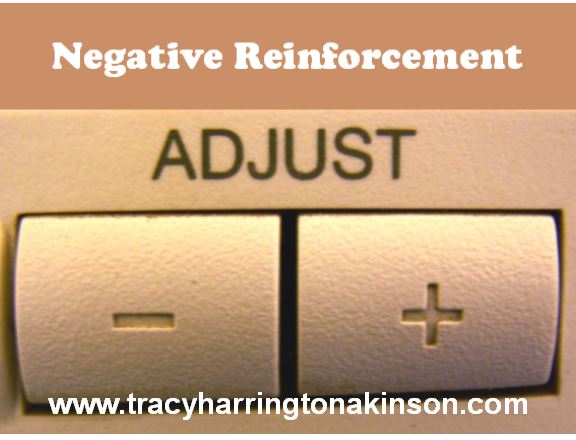Positive reinforcement. Positive attitude. Positive learning environment. All topics I focus on. BUT, in focusing on the positive side, I am repeatedly asked if I subscribe to negative reinforcement. The answer is no -in the traditional sense of the word. I do subscribe to natural consequences -either positive or negative. 
What is the difference between negative reinforcement and natural consequences?
When I was growing up, my father used an analogy to teach his children about the consequences of the choices that we were making. He stated, “If you pick up one end of the stick you will get the other end.” The meaning was simple. If we picked up a stick, we would naturally get both ends of it. We couldn’t choose to leave one end and neglect it. Each end would be coming with us. The same thing applies to our choices. If we made a choice, there would be a natural consequence to those choices. The consequence would always follow the choice.
Negative reinforcement comes with effort to a choice or situation while natural consequences are not contrived but flow naturally from the choice made.
Yelling, screaming, spanking, debasing -all demonstrate a lack of parental control. They lack loving guidance and demonstrate a loss of temper.
Does this mean that I have not lost my temper since I subscribe to natural consequences? No. I wish I hadn’t though.
What about grounding? Does natural consequences subscribe to grounding? Again, no.
Natural consequences, though, unlike picking up the stick may require some creativity. I’ll give an example. When my junior high school son presented less than acceptable grades, the natural consequences are lengthy -taking too long to demonstrate the needed lesson. Poor classes. Inability to get into top colleges. Poor work ethic skills. Less than desirable jobs. This list could go on. Although these consequences are natural, the effects simply are too delayed, resulting in a poorer lifestyle for my son and a less than shining future that he might otherwise obtain. With this in mind, I got creative. We discussed why the grades were so low. He replied that he had new technology and was not using his time wisely. I asked him what he thought we should do to help him to get back on track -after we talked about the natural consequences of his choices. He -with much angst, handed over the new smartphone and stated that he felt he should earn it back.
Does it always go so smoothly? No. The wailing and gnashing of teeth came the next morning when he wanted to ‘quickly’ check his game scores before studying.
Why use natural consequences?
 I chose several decades ago when my first was very small, that I didn’t want to be remembered as the mother that spanked and yelled to convince her children to choose the right. I searched for an alternative and found natural consequences. I found several wonderful books which helped me to mold my discipline theory for my children. The greatest reason I chose this method is simply because I want to reason my children to be good adults who contribute to the well-being of society. I want them to have a purpose. (I also -on a more humorous side -hope that as adults they need the least amount of therapy as possible.)
I chose several decades ago when my first was very small, that I didn’t want to be remembered as the mother that spanked and yelled to convince her children to choose the right. I searched for an alternative and found natural consequences. I found several wonderful books which helped me to mold my discipline theory for my children. The greatest reason I chose this method is simply because I want to reason my children to be good adults who contribute to the well-being of society. I want them to have a purpose. (I also -on a more humorous side -hope that as adults they need the least amount of therapy as possible.)
How to use natural consequences?
It isn’t difficult. It can be easily applied to home life and classroom life. Generally, the consequences come on their own. Other times, not. As stated, sometimes I need to ponder and be creative about the consequences as in the example of my son and his dropping grades. Other times, the result comes about on its own. A good example is being left behind for a special activity because they were late.
Before I interfere in the process of natural consequences and the inevitable results of my children’s choices, I ask myself questions which I created when they were small to help direct my actions?
- Is the behavior detrimental to the well-being of my child?
- Is this behavior in direct contrast to his basic physical safety?
- Is the correction need to develop essential skills to thrive (not survive) in society? (For me these skills are honesty, work ethic, communication skills, etc.)
Each family and classroom needs to create the balance and plan which works for them. What tactics have you employed?
By Tracy Harrington-Atkinson
Tracy Harrington-Atkinson, mother of six, lives in the Midwest with her husband. She is a teacher, having taught elementary school to higher education, holding degrees in elementary education, a master’s in higher education and continued on to a PhD in curriculum design. She has published several titles, including Calais: The Annals of the Hidden, Rachel’s 8 and Securing Your Tent. She is currently working on a non-fiction text exploring the attributes of self-directed learners: The Five Characteristics of Self-directed Learners.

Comments are closed